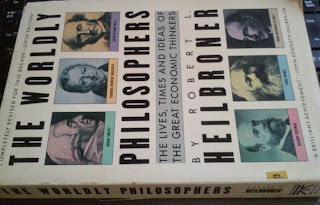A graduate student who could write such a good book is an exceptionally brilliant person. His novel style of writing manifested in this book keeps readers curious and allows readers to be back in the time of those economic thinkers.
Although the author well summarizes main ideas of those philosophers, he frequently focuses less on their defects and weight them against their main theory. Any thinkers have their philosophical opponents, at least in their time. This book is not about which school of thought is right or describes economy more correctly, but about the ideas of those worldly philosophers.
Although it is a good book, it is not very good. I do not rate it 5 over 5 because, firstly, when one can summarize opposing ideas, one should be able to see which is more reasonable. Secondly, I expect more rigorous study on an idea and its opposing view. For instance:
Adam Smith
It is very safe to admire Adam Smith in economics. He is known as the father of economics by many. However, I really doubt people actually read him. It is a sad thing that the author of this book who also wrote Essential Adam Smith missed contradictory points in his books. We tend to think that those free market ideas such as laissez faire, free trade, wealth vs gold were originated from Adam Smith.
I read Adam Smith’s The Wealth of Nations, the abridged edition with summary inside for each section, a few times and found many contradictory points in principle in this same book. For example, the government role in the economy should be big instead of three main ones: promoting rule of law, national defense and high cost public investment. Here I am not discussing in details. I suggest another book An Austrian Perspective on Economic History which deals with this issue comprehensively.
Alfred Marshall
Standing on the shoulder of marginal economists, Marshall could develop the demand and supply curve as we know it today. This is the beginning of modern mathematical economics. In this book, credit was given to Marshall but least to previous marginal economists. In addition, I also feel how powerful this idea is to solve Adam Smith’s Diamond Paradox is not even touched.
Those who are curious why P-curve is vertical, not horizontal, are advised to dig into this part.
Joseph Schumpeter
Schumpeter opined that capitalism would not work. Growth in capitalism is promoted by entrepreneurship of capitalists. Capitalists invest to increase profits. In the long run, they would run out of ideas on what to invest or the profits become zero by competition from other capitalists. This idea of creative destruction is today denied. The author this time takes side.
John Maynard Keynes
Keynes biography, accomplishments and theory are very well summarized. However, his main philosophical opponents Milton Friedman and F.A Hayek are not included. Hayek and his book The Road to Serfdom, however, was used as a wake-up call on Keynes theory that might lead to nothing but socialism. Keynes acknowledged that possibility but put more trust (or hope) on government officials.
Final Say
As its full title suggests, this book is about the lives, times and ideas of those economic thinkers. Those who are puzzling on which school of thought is better, for instance Classical versus Keynesianism, or those who try to find the connection between long run and short run economy may not find the answer here. (I suggest The Clash of the Century). In conclusion, however, this is a good book for its title.
Full title: The Worldly Philosophers: The Lives, Times And Ideas Of The Great Economic Thinkers, Sixth Edition (1986), Touchstone
Author: Robert L. Heilbroner
My rating: 4/5
 |
| Add caption |


